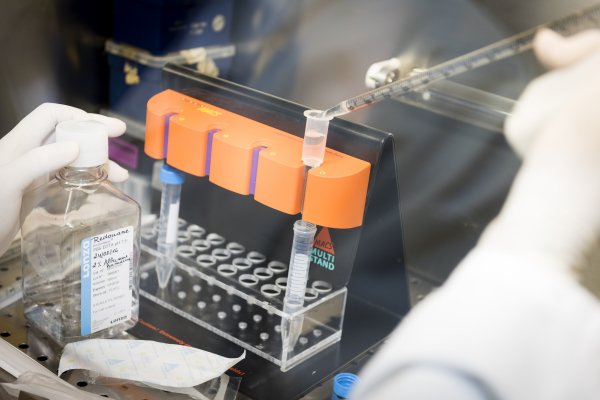
The Molecular Immunology Laboratory strives to improve our understanding of the immune response in cancer and how it can be manipulated to the benefit of the patients. It investigates lymphocyte activities in several clinical conditions:
- First, by studying the organization and cellular state of CD4+ T cells and germinal center B cells infiltrating the breast cancer microenvironment. This work involves both prospective studies designed to understand the functionality and subpopulations of tumor infiltrating lymphocytes present as well as their organization in peritumoral tertiary lymphoid structures, and retrospective studies that seek to apply these findings in the establishment of an immunological grade for breast cancer.
- Second, by identifying and characterizing specific changes in gene expression associated with clinical progression during the transition from pre-malignant disease to full-blown malignancy in patients with hypereosinophilic syndrome that develop T cell leukemia/lymphoma.
- Third, by analyzing specific changes in lymphocyte gene expression, with a focus on transcription factors regulating their normal activities, which are aberrantly regulated in human cancer. Our ultimate goal in the fight against cancer is to further understand how we can harness the power and the specificity of the immune response through its revitalization in the hostile tumor microenvironment to produce effective and sustained anti-tumor immunity.
- Prof. Vincent Detours, IRIBHM, ULB
- Prof. Francois Fuks, Laboratory of Cancer Epigenetics, ULB
- Prof. Erik Goormaghtigh, Laboratory for the Structure and Function of Biological Membranes, Center for Structural Biology and Bioinformatics, ULB
- Prof. Denis Larsimont, Anatomical Pathology Department, Institut Jules Bordet, ULB
- Prof. Alain Lemoine, Hôpital Erasme and Institute for Medical Immunology, ULB
- Dr. Sophie Lucas and Prof. Pierre Coulie, de Duve Institute, Université Catholique de Louvain, Brussels, Belgium
- Prof. Arnaud Marchant, Institute for Medical Immunology and Hôpital Erasme, ULB
- Dr. Marie Ravoet, Genetics Department, Cliniques Universitaires St. Luc, UCL
- Dr. Florence Roufosse, Department of Internal Medicine, Hôpital Erasme, ULB
- Dr. Roberto Salgado and Dr. Gert Van den Eynden, Department of Pathology, GZA Ziekenhuizen, Sint-Augustinus campus, Wilrijk, Belgium
- Dr. Christos Sotiriou, Breast Cancer Translational Research Laboratory, Institut Jules Bordet, ULB
- Dr. Alexandre de Wind, Anatomical Pathology Department, Institut Jules Bordet, ULB
- Dr. Arya Biragyn, Chief, Immunoregulation section, National Institute on Aging, NIH, Baltimore, MD USA
- Dr. Marie-Agnès Doucey, Ludwig Cancer Research, Université de Lausanne, Lausanne, Switzerland
- Dr. Aija Linē, Latvian Biomedical Research and Study Centre, Riga, Latvia
- Dr. Laurence de Leval, Institut Universitaire de Pathologie, Centre Hospitalier Universitaire Vaudois, Lausanne, Switzerland
- Dr. Steven Wolinsky, Department of Infectious Diseases, Northwestern University Feinberg School of Medicine, Chicago, IL USA
Research projects
Project 1
Determine the prognostic and predictive value of detecting tumor infiltrating lymphocytes (TIL) and peritumoral tertiary lymphoid structures (TLS) in an effort to establish an Immunological Grade for breast cancer.
Project 2
Investigate the molecular mediators regulating CD4+ T cells and B cells infiltrating breast tumors.
Project 3
Analyze specific TIL subpopulations to understand their role(s) in the anti-tumor immune response, including follicular helper T cells (Tfh) and B cells, their contribution to TLS formation and function and their regulation by regulatory T and B cells.
Project 4
Study the role that aberrant expression of the transcription factor FOXP1 plays in CD4+ T cell persistence and expansion in breast cancer and how it regulates cytokines/chemokines and thereby affects TIL recruitment to tumors.
Project 5
Explore potential links between anti-tumor immune responses and specific mutations in triple negative breast cancer
Team
Head of Unit
Karen Willard-Gallo, Ph.D. in Microbiology and Immunology, Immunologist
Email: karen.willard-gallo@bordet.be or kwillard@ulb.ac.be
Team
Soizic Garaud, Ph.D., Doctor of Life Sciences and Health, Immunologist
Grégory Noël, Ph.D., Doctor of Life Sciences and Health, Immunologist
Gert Van den Eynden, M.D., M.D., Pathologist at GZA (collaborator)
Laurence Buisseret, M.D., Doctoral thesis student (also related to BCTL)
Cinzia Solinas, Medical Oncologist, Doctoral thesis student
Mireille Langouo Fontsa, M.D., Doctoral thesis student
Edoardo Migliori, M.S., Doctoral thesis student
Pushpamali De Silva, M.S., Doctoral thesis student
Anaïs Boisson, M.S., Laboratory Associate
Hugues Duvillier, M.S., Cytometrist
Céline Naveaux, Laboratory Technician (3/5 time)
Laurence Van Schoonwinkel, Laboratory Technician (1/2 time)
Hélène Strainchamps, administrative assistant
+ each year numerous students (stages, memoires, etc.)